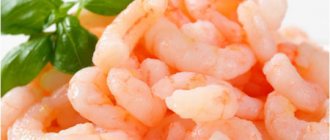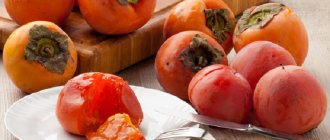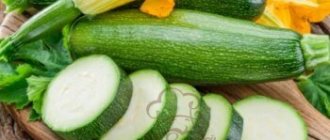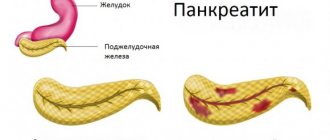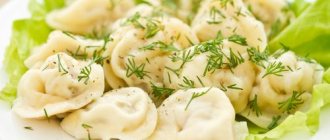Useful properties of persimmon
When the pancreas is inflamed, many fruits and sweets are prohibited from consumption, but some of them are quite capable of replacing desserts. These include persimmon, which has a rich chemical composition, is very tasty and extremely healthy. However, how and when it can be used for pancreatitis, you need to consult your doctor.
Many people love persimmons for their delicately sweet and slightly astringent taste, but in addition to these qualities, they are rich in various vitamins, minerals, and nutrients that have a positive effect on the body, including the functioning of the gastrointestinal tract.
Persimmon is a dietary fruit and perfectly satisfies the feeling of hunger. It contains:
- microelements: iron, calcium, phosphorus, iodine;
- beta-carotene and vitamin A;
- vitamins C and E;
- protein;
- organic acids (citric, malic);
- antioxidants;
- pectin;
- tannins - tannins (they give an astringent effect).
The rich composition of persimmons is superior to apples and grapes in terms of the content of useful substances, so many doctors advise including this fruit in the diet, especially in winter, when the body lacks useful components.
The benefits of persimmon include the following properties:
- Increases immunity.
- Reduces the risk of developing cancer.
- Improves the functioning of the heart and blood vessels, strengthens vascular walls.
- Promotes rapid recovery after illnesses.
- Normalizes the functioning of the gastrointestinal tract, including the pancreas.
- Removes waste and toxins from the body.
- Reduces the risk of stone formation in the gall bladder and kidneys.
- Normalizes the functioning of the thyroid gland.
These are not all the positive qualities of persimmon, but besides them, this fruit can be harmful to health, especially if a person suffers from pancreatitis, and the disease itself is in the acute stage or there are contraindications to consuming this fruit. To avoid unpleasant situations, the use of persimmons should be agreed with your doctor.
How can persimmon be dangerous for pancreatitis?
The danger from eating persimmon is also hidden in its composition. It contains some components that can disrupt the functioning of the digestive system:
- Plant coarse fiber - enhances the functioning of all gastrointestinal organs, including the pancreas. It can cause stool disturbances, diarrhea, abdominal cramps and other unpleasant symptoms that worsen a person’s well-being.
- Acids - have the ability to irritate the mucous membranes of the digestive tract, increase the secretion of gastric and pancreatic juice. With pancreatitis, there will be a difficulty in the outflow of secretions into the intestinal lumen, which can lead to the development of a serious condition - pancreatic necrosis.
- High sugar content increases the load on the endocrine part of the pancreas, which takes part in the production of insulin. Excessive consumption of fruit for pancreatitis can lead to the development of hyperglycemia or diabetes mellitus.
- Tannins have a strong astringent effect, can cause constipation and intestinal obstruction, and also increase the risk of fecal stones forming in the intestines.
If a person suffers from an allergic reaction to red fruits, then persimmon is strictly prohibited for consumption.
To reduce the danger from eating persimmons, you need to choose the fruit correctly, eat it not raw, but prepare jelly, compotes, and desserts. Heat treatment of the fruit significantly reduces the amount of substances that can have a negative effect on the functioning of the intestines and pancreas.
Benefits and negative effects
Persimmon contains the following beneficial substances:
The exotic fruit has a number of medicinal properties:
- Persimmon pulp does not irritate the mucous membrane of the digestive tract. Pectin (active component) normalizes the process of food digestion.
- Has an immunomodulatory effect.
- Persimmon consists of 81% water, and 19% microelements that fill the body with energy and tone it.
- Vitamins A and C are necessary to prevent the development of malignant neoplasms in the pancreas, as well as to accelerate the regeneration of affected tissues.
- It has a diuretic effect, which helps remove waste products from the body.
- Polyphenols reduce blood cholesterol levels.
- The low calorie content of the berry prevents weight gain.
But the fruit can also be dangerous. It is not recommended to eat more than 100 g of persimmon per day.
The harm is as follows:
- Persimmon contains a large amount of sugar, the processing of which requires insulin. But pancreatitis is characterized by the death of cells in the diseased organ, which leads to a decrease in insulin production. Therefore, excessive consumption of exotic berries can lead to the development of diabetes.
- A large amount of tannin (determines the viscosity of the fruit) provokes a violation of intestinal motility. There is a risk of developing constipation, especially if we are talking about an exacerbation of the chronic form of the disease.
Can persimmon cause exacerbation of pancreatitis?
With inflammation of the pancreas, there is almost always increased acidity of the gastric juice, and the presence of iron and acids in the fruit only enhances the shift in the pH of the secretion to the acidic side, which can intensify inflammatory processes and symptoms. However, you should not refuse the fruit; doctors recommend buying the “Korolek” variety of persimmon, since it is much healthier than others and contains a minimal amount of substances that can cause an exacerbation of pancreatitis.
To prevent a recurrence of pancreatitis, it is recommended to consume persimmon in small quantities, and preferably baked, boiled or stewed. Pre-freezing it will help reduce the amount of tannin in the fruit.
If a person suffers from inflammation of the pancreas after eating a little persimmon, he should monitor his well-being. If there are no intestinal disorders or symptoms of exacerbation of pancreatitis, then the product can be consumed, but strictly adhere to the permitted proportions.
Persimmon for acute pancreatitis
During the period of exacerbation of pancreatitis, severe symptoms are observed, in which a person feels severe pain of a girdle nature, there is nausea, vomiting, increased body temperature and other clinical signs that worsen the patient’s well-being.
If such symptoms are present, intensive drug treatment and fasting for 1 to 3 days are recommended, since eating even a small amount of food will only worsen the condition.
During the period of exacerbation, it is only allowed to drink still water and rosehip decoction. When the symptoms subside, porridge with water, low-fat and light foods can be introduced into the diet.
Considering all the difficulties of this period, we cannot talk about consuming persimmons. Eating this fruit will only intensify the symptoms of acute pancreatitis and can provoke serious complications.
Persimmon for chronic pancreatitis
The chronic form of pancreatitis does not have pronounced symptoms, the digestion process returns to normal, and occasionally minor discomfort or problems with stool may appear. The period of remission can last several weeks or months, it all depends on the person’s lifestyle, nutrition, and compliance with medical recommendations.
After the acute period is over, the functioning of the pancreas and intestines is normalized, the patient’s menu is gradually expanded. His diet may include liquid soups, lean meats, some vegetables and fruits. It is recommended to introduce persimmon into the menu no earlier than 3–4 weeks after an exacerbation of pancreatitis and only on the recommendation of a doctor.
Initially, it is consumed baked and ground - 1 teaspoon per day. If well tolerated, the volume of the dish can be increased to 1 fruit per day, no more than 2 times a week.
When the body has fully recovered, persimmons are allowed to be eaten raw, but in small quantities. You can eat it as an afternoon snack, as a dessert, make small snacks, or make juice by diluting it 1:1 with water.
Useful recipes for a patient with a weakened pancreas
The new product is introduced into the patient’s menu gradually so as not to provoke stool disturbances, pain or exacerbation of pancreatitis. First of all, pay attention to baked fruits without any additives and, if your body reacts favorably to the new product, prepare more varied dishes - mix it with other ingredients, add it to casseroles, salads and pies. Later, persimmon fruits are consumed as an independent dish for an afternoon snack or a snack between main meals. How to prepare persimmons so that they can be eaten with pancreatitis?
Doctor's advice
Judging by the reviews of many gastroenterologists, persimmon is a healthy fruit that has a number of positive qualities. Provides the body with the necessary nutrients; when used correctly and in moderation, it has a positive effect on the functioning of the gastrointestinal tract.
Some medical sources contain information that persimmon promotes the healing of damaged pancreatic tissue, but it only brings benefits outside of exacerbation of pancreatitis.
If you consume persimmon fruits during an exacerbation of pancreatitis, it will slow down the recovery period, worsen the patient’s condition, and in some cases can provoke the development of organ necrosis or diabetes mellitus.
People who suffer from:
- diabetes mellitus;
- obesity;
- fruit intolerance;
- allergic reaction;
- intestinal obstruction;
- exacerbation of gastrointestinal diseases.
Many doctors from the field of gastroenterology and nutritionists are of the opinion that persimmons can be consumed for pancreatitis, but only when the disease is in remission, and at least 3 weeks have passed from the period of exacerbation.
Rules for introducing persimmon into the diet for pancreatitis
When introducing persimmons into your diet, you should follow several rules:
- It is not advisable to eat more than one fruit per day.
- If the baked fruit is well tolerated by the body, then you can eat raw fruit without peel in small quantities.
- It is not recommended to eat persimmon on an empty stomach.
- You should not eat unripe fruits, as they contain large amounts of tannin, which has a strong astringent effect and can cause intestinal obstruction.
- After consuming it, you should not drink water or eat other foods - an interval of at least 1 hour.
- It's better to eat it as an afternoon snack.
- Fruits for consumption must be ripe, brightly colored, and free of dark spots.
If after eating the fruit there is discomfort in the stomach, pain under the left rib, or abnormal bowel movements, the next dose should be abandoned.
It is important to understand that even a small amount of persimmon or other prohibited foods for pancreatitis can provoke an exacerbation, so before introducing this product into your diet, you should consult with your doctor.
We invite you to watch the video “Persimmon. For whom it is useful and for whom it is contraindicated. Advice from a nutritionist."
Forms in which use is prohibited
First of all, it is worth remembering that in acute and reactive pancreatitis, enzyme-forming systems are significantly disrupted. As a result, pancreatic enzymes are activated prematurely - before being released into the duodenum. As a result of such a violation, autolytic processes begin in the gland - enzymes digest parenchyma tissue. Therefore, during the acute period, it is necessary to avoid eating the fruit. Substances contained in the treat can worsen the patient’s well-being.
First of all, the negative impact on the organ is due to the content of such substances:
- Glucose.
- Sucrose.
- Tannin.
To avoid complications, you should follow a fasting diet for several days. It is very important to exclude irritating foods. Gentle food includes ground and steamed dishes, broths and jelly.
Attention! You should not eat persimmons if your blood test also shows elevated glucose levels due to pancreatitis.
During an exacerbation of a chronic type of disease, persimmon is also contraindicated. This is due to the need to adhere to a strict diet.
An acute process in the pancreas requires a special approach to diet
How to choose the right persimmon
To get the maximum benefit from eating persimmons, you need to choose the right fruit. To do this, you must adhere to several rules:
- You need to buy fully ripe fruits. Good ripeness of persimmon is indicated by its bright orange color and soft feel.
- The peel should be intact and free of dark spots.
- The fruits should not show signs of rot or mold.
- For pancreatitis and other diseases of the gastrointestinal tract, you need to choose the “Korolek” variety, which contains many alkaline salts that reduce the acidity of pancreatic and gastric juice.
Persimmon for pancreatitis can bring both benefits and harm to health, so it should be consumed only on the recommendation of a doctor and only when the disease is in remission. It is important to understand that in case of diseases of the digestive system, in particular with an inflamed pancreas, you need to be careful when consuming berries and fruits. With pancreatitis, it is very important to monitor your diet, since the slightest errors in the diet can cause an exacerbation with a pronounced clinical picture.
The following articles may be useful to you: Useful herbs for the liver and pancreas The healthiest foods for the liver The best choleretic herbs How and why the liver hurts Can you eat bananas for diarrhea and diarrhea Functions of the liver in the human body
Eating persimmon during remission
Berry for pancreatitis and cholecystitis is allowed during the period of remission, but under certain conditions, which include the following:
- at least 2 months have passed since the exacerbation;
- you need to start with small portions, no more than 1 teaspoon per day;
- It is better to eat this product baked;
- for dilution, the fruit can be added to prepared dishes;
- in order to avoid constipation, you can eat only ripe fruits of bright red color;
- You should avoid spoiled fruits;
- At first, only the pulp is suitable for consumption.
Acute pancreatitis and these astringent berries are incompatible things. During the period of illness, the body is not able to process such amounts of sugar, which practically guarantees the formation of diabetes mellitus.
Berry is a unique fruit that contains a large amount of vitamins necessary for the body, especially if it is weakened. Despite the fact that persimmon is very useful for pancreatitis and other diseases, it should be used with caution and after consulting a doctor. It is worth remembering the precautions and purchasing only ripe and high-quality berries.
During any illness, you should not deny yourself the pleasure of eating what you really want. But this must be done correctly, following the recommended dosage, and then the food will only benefit the body.
An ovarian cyst is a neoplasm that can cause a lot of trouble for a woman. There are various causes of this disease. Therefore, any woman needs to closely monitor her health.
The interpretation of an ultrasound of the thyroid gland includes information about the size, structure and condition of the organ. The specialist’s description indicates the presence or absence of diseases.
Description of the main hormones that are synthesized by the thyroid gland. Their functions and mechanism of influence on the body have been established and analyzed. Review of the most commonly used laboratory methods for diagnosing thyroid dysfunction.
-to the doctor
Answers questions:
Melnikov Oleg Valerievich
Endocrinologist with 10 years of experience
The insulin index characterizes the body's production of insulin in response to a particular food product. The table of foods with a low index will be of interest to type 1 diabetics.
If your blood sugar is high, then your weekly menu should be designed in such a way that it contains as few fast carbohydrates as possible. It is better to eat natural products.
Porridges such as barley, buckwheat, millet and oatmeal are excellent dietary products for diabetics, especially type 2. Their benefits and harms depend on the characteristics of the body.
Eutirox and L-Thyroxine are used for disorders of the thyroid gland. The main difference between them is the side effects. To understand which is better, it is worth considering other factors.
Eutirox can only be used for weight loss under medical supervision. It enhances metabolic processes in the body, due to which excess weight is burned faster.
It is worth using pharmaceutical drugs that increase testosterone production, and even more so injecting it directly, only under the supervision of a doctor. Self-medication can be harmful.
The rules for donating blood for hormones, especially those of the thyroid gland, require short-term dieting and giving up bad habits. Violations of recommendations will interfere with diagnosis.
Parathyroid hormone is produced in the human parathyroid glands. With its help, the level of calcium and phosphorus in the body is regulated. Elevated levels of parathyroid hormone indicate the presence of certain diseases.
You can take a thyroid hormone test on any day, but you need to prepare for it in a certain way. Before donation, you must not drink, smoke or eat.



